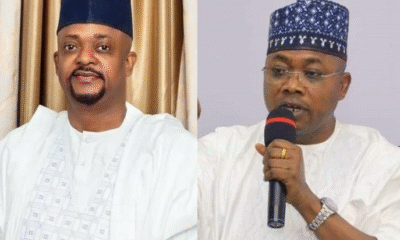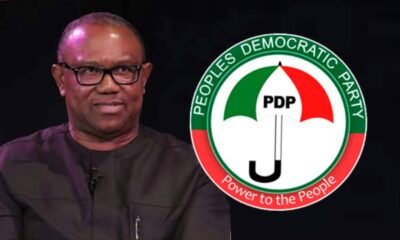Politics
How My Administration Intends To Eliminate Fuel Subsidy – Tinubu

Bola Tinubu, the presidential candidate for the All Progressives Congress (APC), has stated that, if elected in the elections held next year, his administration will gradually eliminate fuel subsidies.
In addition to gradually eliminating gasoline subsidies, he pledged to speed up the Petroleum Industry Act’s implementation and to put in place additional beneficial measures to entice investment in Deepwater assets within six months.
These were included in his manifesto, which THEEAGLE received exclusively on Friday.
Tinubu claims that if I am elected, I would completely deregulate the downstream industry and make sure that the capacity of the nearby refineries is sufficient to meet the needs of domestic consumption.
He said, “We shall phase out the fuel subsidy yet maintain the underlying social contract between government and the people. We do this by dedicating the money that would have been used on the subsidy to fund targeted infrastructural, agricultural and social welfare programs ranging from road construction to boreholes, public transportation subsidies, and education and healthcare funding programs. In this way, the funds are more directly and better utilised to address urgent social and economic needs.
READ ALSO: How APC Smuggled My Name Into Tinubu’s List Without My Consent…
Why I Rejected Appointment Into The APC Presidential Council
Minister Sacked For Condemning Russia’s Annexation Of Ukraine
Putin Begins Teaching 4 Year Olds To Use AK47s, Grenade Launchers
“Our planned approach will not only mitigate the price effects of deregulation but will also result in the significant expansion of public infrastructure and improvement of public well-being.
“Subsidy removal and deregulation are, however, only part of the solution. To further increase our refining capacity, we shall focus on the rehabilitation of the nation’s refineries and shall consider, as a model, the joint venture partnership arrangements implemented by other leading oil-producing states and global petrochemical firms.”
TinubuA added, “We will hasten the implementation of the Petroleum Industry Act and implement favourable policies to stimulate investment in the deep-water assets such as encouraging negotiations regarding signature bonus payment and/or deferral of the payment post development, royalty reliefs amongst others.”
Following the World Bank and International Monetary Fund’s recommendations, President Muhammadu Buhari had stated last year that he would end the fuel subsidy.
Instead, the government announced that roughly 40 million destitute Nigerians will get N5,000 per month as a transportation allowance.
According to the World Bank’s forecast, Nigeria will spend around N4 trillion on fuel subsidies in 2022. However, according to oil marketers, if crude oil prices continue to rise, that figure might reach N6 trillion.
THEEAGLE has previously reported on January 25, 2022, that the federal government wanted to extend the implementation period for subsidy elimination by an additional 18 months.
Timipre Sylva, the Minister of State for Petroleum Resources, made this announcement at a special briefing on gasoline subsidies that the Presidential Communication Team organized at the Presidential Villa in Abuja.
In accordance with current economic realities, he claims that the extension will provide all stakeholders enough time to make sure that the implementation is carried out in a way that ensures the required procedures are in place to mitigate the effect of the elimination of the PMS subsidy.
On March 14, 2022, Punch reports that the government is still in talks with organized labor over eliminating the subsidies.
The withdrawal of the gasoline subsidy, according to representatives of the Nigerian National Petroleum Company Limited and the Nigerian Midstream and Downstream Petroleum Regulatory Authority, had been a contentious topic.
They claimed that despite the ongoing growth in the amount spent on subsidies in tandem with the recent rise in crude oil prices, this forced the government to enter negotiations with the organized labor on the issue.



























